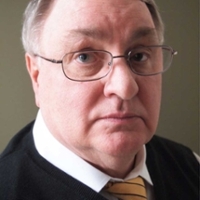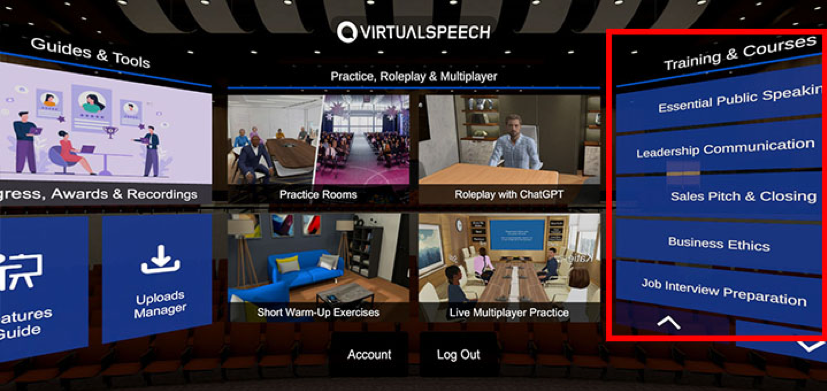Steven Overbey was ready to retire last June. Actually, it would be more accurate to say that he was ready to retire again—when he took the job as director of public speaking at IUPUI in 2015, he'd already retired from a business career and spent 20 years as adjunct faculty.
As a goodbye gift of sorts to the Speaker's Lab, Overbey used the remainder of the research funds in his account to buy 12 Meta Quest 2 virtual reality (VR) headsets. Next, he used funds from his textbook royalty account to cover 900 VirtualSpeech software licenses for use with the VR headsets and via a web browser. He had emptied his accounts in preparation for retirement, but he wasn't ready to let go of the project. He was too invested in the success of the new model he'd developed, the VR Speech Lab.
During the COVID-19 pandemic, Overbey started searching for a way that online students could get presentation experience similar to having a live audience. Overbey saw the potential of VirtualSpeech as an educational tool that could benefit anyone with serious anxiety about public speaking—practically everyone emerging from the pandemic.
The initial pilot led to national coverage, with IU Indianapolis boasting the first public speaking program in the world using VR as a teaching tool. After the wow moment of seeing what's possible, students are hooked. They can practice in the safe spaces of the virtual environment until they feel ready to present in real life (the VR even mimics challenges like people looking bored or distracted).
Using VR to practice in front of an audience is just one aspect of the overall experience. Overbey redesigned the three recording rooms in the original Speaker's Lab to lead students through creating an effective presentation:
- They start in the consultation room, where student mentors help them brainstorm a topic, write their outlines, and organize their thoughts.
- Next they head into the new VR Speech Lab, with the headsets, to practice their presentation in a relevant environment (student VR specialists are on hand to help).
- They can also opt to use the recording and teleprompter room, so they can create a final product for wider sharing and inclusion in their e-portfolios.
As Overbey's team reorganized the lab into those three areas, they realized they could have an impact on students not just as they take the course, but in their future academic courses and in their future careers.
In the case of VirtualSpeech, students use the experience of sitting across from simulated audiences to build comfort and confidence. Training includes essential public speaking, leadership communication, and job interview preparation. Students can select practice rooms that range in size from office meeting rooms and small press conferences to large lecture halls and conference venues. They can also opt for role play with ChatGPT, warm-up and impromptu exercises, or live multi-player practice.
The VirtualSpeech software and its many resources are offered to all students in IU Indy's R110 fundamentals of speech course, which is a requirement for all majors. Over 1,800 students are taking the course this semester, and 3,000-4,000 will take it this year. But Overbey's mission is to open up the VR Speech Lab and headsets with the software to as many people as possible, so availability is not limited to the course.
Partners like University Library (whose VR lab offers 28 headsets for checkout), the Idea Garden, the Medical Library, Digital Education Programs & Initiatives, and the Extended Reality Initiative are helping expand the availability of VR for teaching and learning. And Overbey's team is creating a website with data and details on everything involved in getting the VR Speech Lab up and running, so others can create similar programs.
In the future, Overbey hopes to pilot an approach that is not dependent on expensive VR headsets. Instead of buying a $50 course textbook, students would pay under $20 for a software license and something like Google Cardboard VR glasses. As he put it, "We're putting a lot of thinking into what we can do to help all students be successful, what we are teaching that will scaffold into something they're taking next semester, what we can do to build something that's usable for the future."



